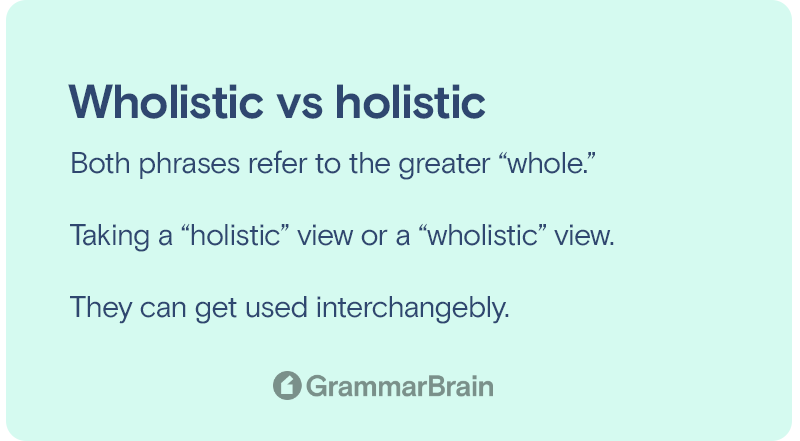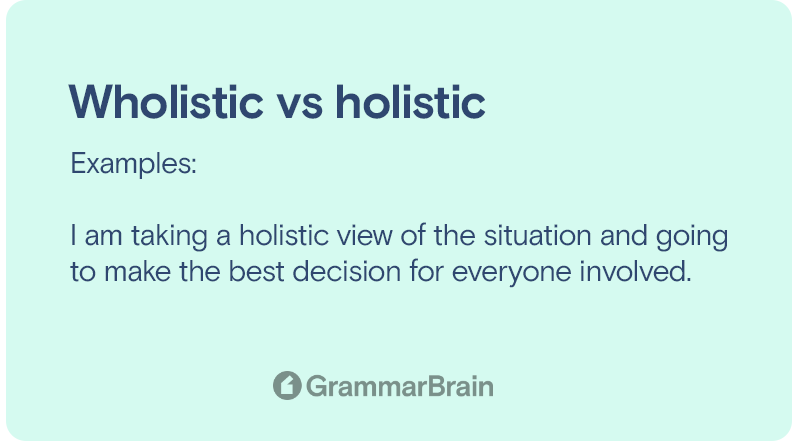What is the difference between wholistic and holistic? These words have similar sounds, although they hold entirely different meanings. These are sometimes referred to as homonyms.
A good example of this is are the terms “wholistic treatment” and “holistic treatment,” these sound alike, although they hold very different meanings.

What Does Holistic Mean?
Merriam-Webster describes the word “holistic” as a medical word related to holism (a word and term that Jan Christian Smuts utilized in 1926).
Holism means “the whole is more remarkable than the sum of its few parts.” The word opposes the Western analysis theory, “the collapsing of wholes into a few parts.” The origin of the word “holistic” comes from the Greek word “holos,” meaning “whole.”
This can easily apply to some holistic care approaches using the idea of recovering the whole body and its interchangeable parts. The interchangeable parts contain the mind, body, spirit, and soul.
Holism is an idea meaningful in medicine, sciences, and social science. Holistic medicine focuses further on treating the individual without the help of many current medicines. It highlights the relationship between the mind and body.
The practice comes from Eastern countries, where they suggest medical approaches such as acupuncture and yoga.
Holistic is the correct spelling or standard spelling, meaning “the whole is greater than the sum of its parts.”

What Does Wholistic Mean?
The word “holistic” was formed in the 1920s by a scientist and a South African soldier named Jan Christian Smuts. And the word “wholistic” is just a misspelling of the word holistic.
However, the Cambridge Online Dictionary describes the word “wholistic” as the treatment of a whole person and not simply a single part. It’s an adjective emanating from holistic and crossed with the whole.
The word “wholistic” represents health, healing, and healthcare providers.
They have different meanings depending on the analysis of reviews and literature.
“Wholistic health” care is truly the diagnosis, assessment, and prevention of human disease to enhance healing or maintain health.
It concentrates mainly on your whole, such as:
- Experiences
- Development
- Communication
- Assets
- Lifestyle
- Emotions
- Environment
- Genetics
- Attributes of Wholistic
- Culture
- Health Promotion
- Spiritual Integration
- Empowerment, Coordination, and also Assessment of Health Care
- Disease Management
Examples of Using of Holistic and Wholistic In Sentences
- The scientist alerted that a holistic method to fighting climate modification will be needed.
- Mike embraced a holistic approach and cleaned out the refrigerator: Mike threw out all that had been there for over a week.
- He moved to South Africa, where, he told researchers, he became curious about holistic healing and an organic lifestyle.
- The nonprofit had taken a wholistic approach to the charity.
- Marie unlocked a holistic healing practice but has not healed many clients yet.
- The organization presented a wholistic review of its economic situation.
- The holistic approach of school emphasizes meeting the unique needs of each learner.
- Her book presents a wholistic view of life.
- I did not feel fit until I tried a holistic approach and adopted a lot of treatments.
Conclusion
Both “holistic” and “wholistic” refer to health. Someone may take a “wholistic approach” to your general health. And someone could be very “holistic” about how they think about a situation.
It’s okay to use both “wholistic assessment” and “holistic assessment.” Although, if you are looking for one preferred word over another, it would be “holistic” rather than “wholistic.”
Both words are referring to something that is a cohesive whole, rather than a singular point of view. Or a single vantage point on a situation (single modality).
FAQs
Which is correct wholistic or holistic?
Holistic and wholistic are generally used interchangeably, but the correct one is the word holistic. They sound the same and also mean the same. But wholistic is the misspelling of holistic.
What is the meaning of the word wholistic?
Wholistic comes with the same meaning as holistic. However, it’s typically considered a misspelling of the word holistic. Typically, holistic is more suitable to use in a medicinal context, but wholistic is better in another context.
Which is correct a holistic approach or a wholistic approach?
A holistic approach is the correct one. The correct spelling is holistic and not the word wholistic. You should say or write a “holistic approach” rather than using “wholistic approach.”
Inside this article
Fact checked:
Content is rigorously reviewed by a team of qualified and experienced fact checkers. Fact checkers review articles for factual accuracy, relevance, and timeliness. Learn more.
Core lessons
Glossary
- Abstract Noun
- Accusative Case
- Anecdote
- Antonym
- Active Sentence
- Adverb
- Adjective
- Allegory
- Alliteration
- Adjective Clause
- Adjective Phrase
- Ampersand
- Anastrophe
- Adverbial Clause
- Appositive Phrase
- Clause
- Compound Adjective
- Complex Sentence
- Compound Words
- Compound Predicate
- Common Noun
- Comparative Adjective
- Comparative and Superlative
- Compound Noun
- Compound Subject
- Compound Sentence
- Copular Verb
- Collective Noun
- Colloquialism
- Conciseness
- Consonance
- Conditional
- Concrete Noun
- Conjunction
- Conjugation
- Conditional Sentence
- Comma Splice
- Correlative Conjunction
- Coordinating Conjunction
- Coordinate Adjective
- Cumulative Adjective
- Dative Case
- Determiner
- Declarative Sentence
- Declarative Statement
- Direct Object Pronoun
- Direct Object
- Diction
- Diphthong
- Dangling Modifier
- Demonstrative Pronoun
- Demonstrative Adjective
- Direct Characterization
- Definite Article
- Doublespeak
- False Dilemma Fallacy
- Future Perfect Progressive
- Future Simple
- Future Perfect Continuous
- Future Perfect
- First Conditional
- Irregular Adjective
- Irregular Verb
- Imperative Sentence
- Indefinite Article
- Intransitive Verb
- Introductory Phrase
- Indefinite Pronoun
- Indirect Characterization
- Interrogative Sentence
- Intensive Pronoun
- Inanimate Object
- Indefinite Tense
- Infinitive Phrase
- Interjection
- Intensifier
- Infinitive
- Indicative Mood
- Participle
- Parallelism
- Prepositional Phrase
- Past Simple Tense
- Past Continuous Tense
- Past Perfect Tense
- Past Progressive Tense
- Present Simple Tense
- Present Perfect Tense
- Personal Pronoun
- Personification
- Persuasive Writing
- Parallel Structure
- Phrasal Verb
- Predicate Adjective
- Predicate Nominative
- Phonetic Language
- Plural Noun
- Punctuation
- Punctuation Marks
- Preposition
- Preposition of Place
- Parts of Speech
- Possessive Adjective
- Possessive Determiner
- Possessive Case
- Possessive Noun
- Proper Adjective
- Proper Noun
- Present Participle
- Prefix
- Predicate



